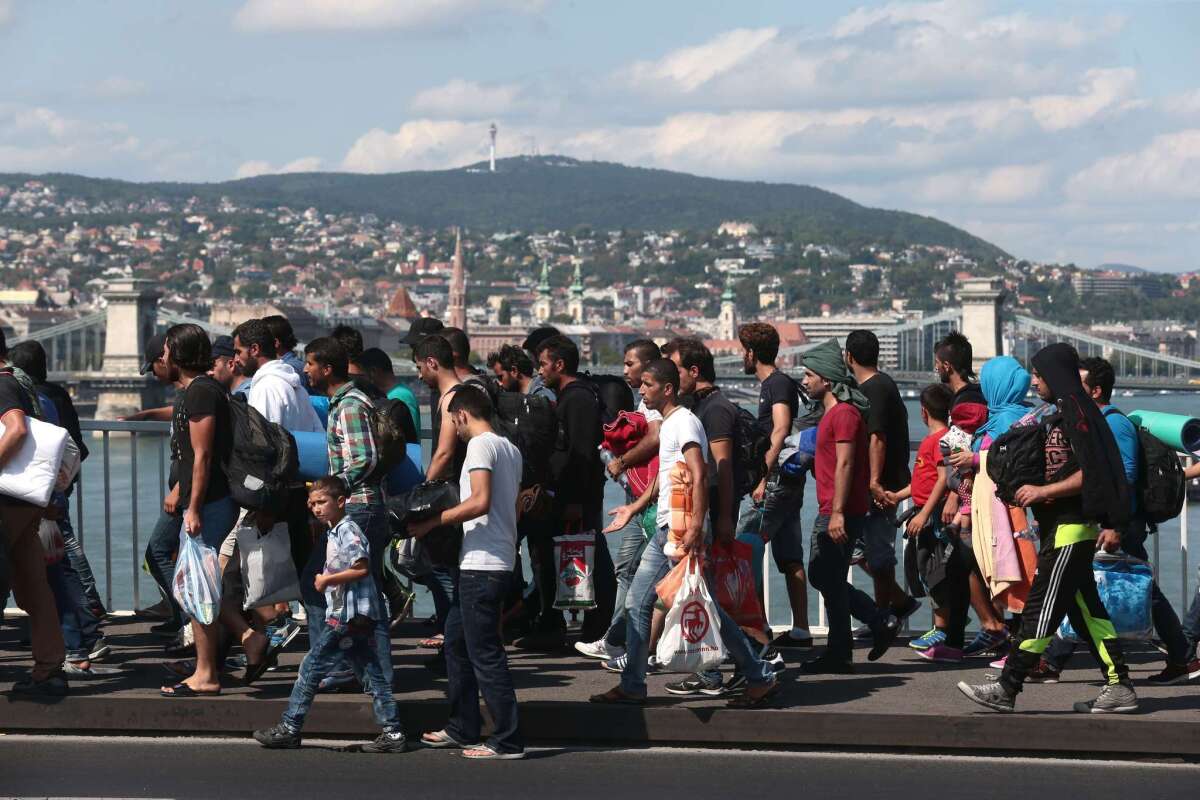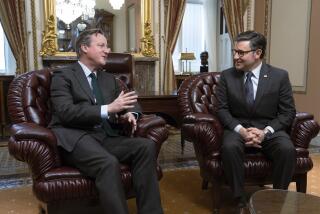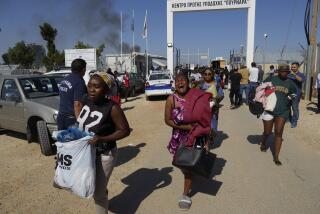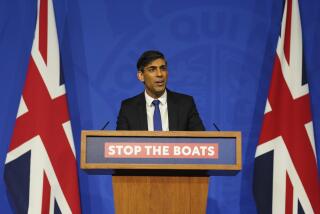Britain offers to take more refugees; hundreds make their way in Hungary

Hundreds of refugees walk on the Elisabeth Bridge after leaving the transit zone of the Budapest main train station on Friday intent on walking to the Austrian border. They were part of an estimated 2,000 migrants stuck in makeshift camps after railway authorities had blocked them from boarding trains to Austria and Germany.
Prime Minister David Cameron said Friday that Britain will help resettle thousands more Syrian refugees amid mounting pressure to deal with the growing humanitarian crisis.
And early Saturday, Austrian Chancellor Werner Faymann reportedly announced that Austria and Germany would allow migrants to enter those countries.
Hundreds of frustrated and exhausted migrants stranded in Hungary on Friday had made a break for the border on foot.
One group left Budapest’s Keleti station saying they were planning to walk to Vienna, a distance of about 130 miles, after trains in that direction were indefinitely suspended Thursday.
They snaked through the Hungarian capital in the blazing sun forming a long line that reportedly contained people in wheelchairs, on crutches and barefoot.
See the most-read stories this hour >>
Another group of migrants broke out of train carriages in Bicske station, northwest of Budapest, where they had been holed up since Thursday when their journey came to a halt near one of the country’s large camps for asylum seekers.
Several hundred people made a break for it, overwhelming police and running down the tracks in the direction of Austria, more than 80 miles to the west.
Speaking in Lisbon, Cameron that said there was a “moral responsibility” to help the thousands of people fleeing to Europe and that Britain will act with “our head and our heart” in providing refuge for those in need.
But he added that the new arrivals in Britain will not come from among those now on European soil but from a program already in operation that resettles refugees in camps bordering Syria.
“Given the scale of the crisis and the suffering of people, today I can announce that we will do more in providing resettlement to thousands more Syrian refugees,” Cameron said.
Stressing that Britain had not been a silent partner in this growing humanitarian disaster, Cameron said Britain already has accepted 5,000 Syrians and provided more than $1.3 billion to help those affected in Syria and the surrounding region.
“Were it not for massive aid, the numbers making the perilous journey to Europe today would be even higher,” he said.
The prime minister’s promise to take in more refugees marked a shift in policy — he previously had argued that simply taking in more people was not the solution.
That stance received increased and intense criticism in recent days after heartbreaking images emerged of a drowned Syrian toddler named Aylan Kurdi, whose body washed up this week on a beach in Turkey.
His mother and 5-year-old brother also died after the inflatable boat they were traveling in from Turkey to Greece capsized. The child’s father survived and has spoken of their harrowing ordeal.
The front pages of Britain’s newspapers, typically a strong barometer of the national mood, also have noticeably changed their tone. The Rupert Murdoch-owned Sun newspaper on Friday used the headline “For Aylan” to announce it had started a campaign to help thousands of children caught up in the migrant crisis.
Aylan’s father, Abdullah Kurdi, buried his wife and two sons Friday in their hometown of Kobani in northern Syria. A small crowd gathered as their bodies were lowered into the ground wrapped in clean white cloth.
Earlier, as the bodies were transferred across the Turkish border, the grieving father called on governments — particularly those along the Persian Gulf — to do more.
“I want Arab countries — not European ones — to see my children,” said Kurdi, according to Turkish newspaper Today’s Zaman. “And because of them to help people.”
More than 2,500 migrants and refugees have died trying to cross the Mediterranean this year, according to U.N. estimates.
Kurdi also said he has abandoned any plans to again leave his homeland, which is in the fifth year of a civil war.
“He only wanted to go to Europe for the sake of his children,” an uncle of the father told the Associated Press. “Now that they’re dead, he wants to stay here in Kobani next to them.”
The decision by hundreds of migrants in Hungary to start walking west came at the end of a fraught week.
On Monday, more than 1,000 people at Keleti station were allowed to board westbound trains, but the next day, authorities suddenly closed the station. A squalid camp quickly sprang up in the area with an estimated 3,000 people.
On Thursday, the station was reopened, but trains heading west into other European countries were suspended, causing mass confusion and frustration. Many people had tickets but lacked travel documents.
Austria, Germany and other wealthier European nations have been seen as the most desirable destination for the thousands fleeing their war-torn homelands in the Middle East, Africa and Asia.
Tensions also remained high Friday at Bicske station, near one of the country’s asylum-seeker camps, where hundreds of people had refused to leave a train that halted there the day before.
Some have tickets to Berlin or Vienna and do not want to register as an asylum-seeker in Hungary, thinking their chances will be much better if they can make their claim in Germany or Austria.
On Friday, hundreds of the refugees made a frantic dash away from their holdout inside the carriage, breaking through a police cordon and leaving riot police scrambling to grab their helmets and push back those still on board. Those who remained stuck inside the train were heard shouting and screaming, and infants could be heard crying.
Hungarian Prime Minister Viktor Orban has taken a tough stance against migrants and refugees, including building a razor-wire barrier along the border with Serbia and sending 3,500 troops to defend it. On Friday, his parliament passed tough measures to crack down on migrants and human traffickers.
Attempts to come up with a unified European Union-wide solution to the problem appear to be foundering.
In Prague, a meeting of Czech, Hungarian, Slovakian and Polish prime ministers rejected calls that each EU nation accept a quota of people seeking refuge.
The International Organization for Migration in Greece estimates that more than 5,000 migrants and refugees a day have crossed the Aegean Sea into Greece in the past week. It says the largest group are Syrians, followed by Afghans, and the groups are predominantly men, families with children and minors accompanied by close relatives.
IOM Greece says many of the families, especially the Afghans, include pregnant women and newborns.
Boyle is a special correspondent. Special correspondent Glen Johnson in Istanbul contributed to this report.
ALSO:
Why more people are eating insects
Trump’s first foreign policy pop quiz goes badly
Jorge Ramos is on the defensive over his role as journalist and immigrant advocate
More to Read
Start your day right
Sign up for Essential California for news, features and recommendations from the L.A. Times and beyond in your inbox six days a week.
You may occasionally receive promotional content from the Los Angeles Times.






